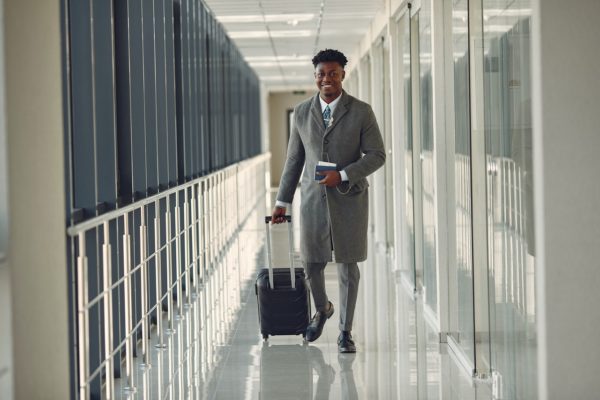By Claire Ballentine and Alice Kantor
Fallout from the new, potentially riskier COVID-19 variant detected in southern Africa is adding fresh frustrations for travelers, just as they were glimpsing a return to normalcy. The U.S., European Union members, Canada and Hong Kong are all restricting travel from several nations in southern Africa. The U.K. halted flights, placed six African countries on its travel “red list” and will require arriving travelers to quarantine in hotels in an attempt to quash the spread of the B.1.1.529 variant — to which the World Health Organization has assigned the Greek letter omicron.

Those moves are set to make some travel plans more expensive. South Africa’s placement on Britain’s red list upended Lizelle Nightingale’s graduation plans. The 38-year-old from Northampton in the U.K. had intended to travel to the University of the Free State in Bloemfontein, South Africa, where she was to celebrate earning her business degree.
Nightingale and her husband spent 1,600 pounds ($2,131) in total for flights in the first week of December, plus the cost of her graduation robes and a car rental. If the couple go ahead with their plans, they will now have to book a quarantine hotel on the way back, costing them more than 4,000 pounds, not to mention 11 nights in isolation.
“It breaks my heart because I was looking forward to my graduation,” said Nightingale, who is still trying to decide whether or not she will travel. “This is my first bachelor’s degree and it’s something I worked really hard for. I started crying when I heard.”
Callum Perry landed in London on Friday morning as the travel landscape shifted. The 26-year-old conservationist is based in Limpopo, South Africa, and came to the U.K. to visit his father for health reasons.
But now he’s worried he won’t be able to travel back home. He’s seeing flights to South Africa cancelled and is concerned that his — scheduled for next Friday — will be axed, too.
“We’re seeing countries like the U.K. move really quickly, so the number one challenge is that the shutdowns are happening quicker than ever,” said John Clifford, president of International Travel Management. “People feel stranded and sidelined.”
But there are services that can get you back to your home country if you’re stuck. Clifford says two services he recommends are Medjet — a global medical transport and crisis response company — and Covac Global, which provides evacuations and repatriation services.
“The first and best thing you can do is get a cancel-for-any-reason travel policy,” said Clifford. “Most travel companies sell some kind of CFAR travel insurance. It usually costs about 15% of your pre-purchase expenditures.”
That doesn’t offer full reimbursement — it’s usually between 40 and 80% of your loss. But it at least gets you some money back when you cancel a nonrefundable trip for an unexpected reason, he said.
“If people are traveling to South Africa, clearly you’re not going so you should have plan B,” said Clifford. “What we’re seeing is that clients are doing ‘trip stacking’ — they’re booking two or three trips at a time. You’ve got an option or two already booked and confirmed before you travel that you can cancel for any reason.”
In Johannesburg, Dennis Wabomba is reeling. He had planned a vacation in the first week of December that’s now been thrown into disarray. His original itinerary was to fly into Abu Dhabi, then to the U.K., and from there to Jamaica.
“I bought all the tickets and accommodation bookings but look now,” he said. “As everything got settled with my British visa last week this happens.”
He’s trying to get a reimbursement for his $6,000 flight but hasn’t heard back yet from his travel agent about whether it went through.
“I may have a couple of beers and I’ll get over it I guess,” he said.
Meanwhile, Frank Venter, a 35-year-old PhD candidate in parasitology and molecular biology in Edinburgh says he has some serious thinking to do this weekend.
He hasn’t been home to visit family in Pretoria, South Africa, in two years. He spent 800 pounds on a ticket home, but additional visa expenses, the threat of hotel quarantine or travel change fees, and the risk that he can’t come back to defend his thesis are giving him pause.
“It’s just unending,” he said.
Brett Snyder, president of Cranky Concierge, an air travel assistance service, says consumers stuck in tricky situations because of policy changes shouldn’t panic. Variants of concern have arisen before — often followed by swift action from governments. Fortunately, travelers may have a few avenues if they want to get their money back.
“If your flight is cancelled, there’s a decent chance you will be eligible for a refund, given there isn’t a flight an hour later,” he said. “But if you just don’t want to go, it may not be an option to get money back.”
Snyder also advises that travelers make sure their contact information is up-to-date with their ticket provider. That way if there is a cancellation, the provider can get in touch.
More stories like this are available on bloomberg.com.




